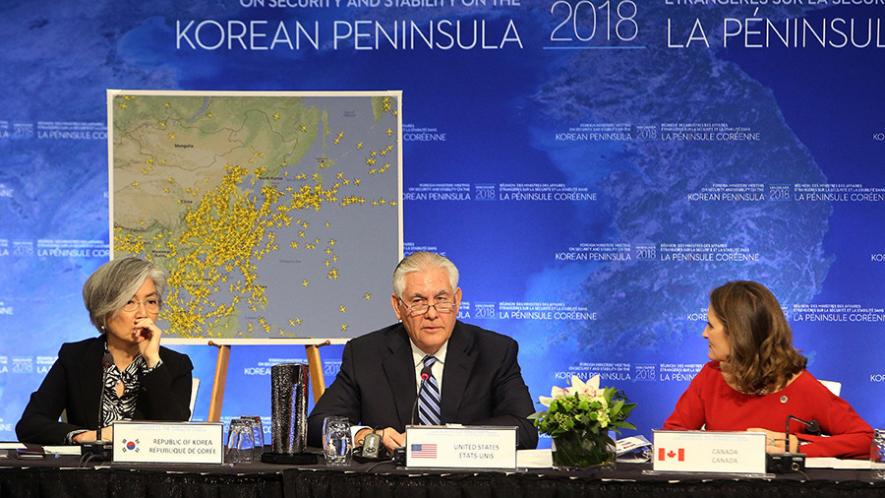Vancouver Summit: Is US Trying to Invoke the Ghosts of Korean War?

Image Courtesy: Yonhap/IANS
The United States and Canada co-hosted a summit on North Korea, attended mostly by countries that supported Seoul during the 1950s Korean war against the North. The same countries that played a decisive role in cutting separate the two Koreas almost six decades ago are now back trying to ‘decide the fate of Korean peninsula’.
The ‘Vancouver Foreign Ministers Meeting on Security and Stability on the Korean Peninsula,’ was attended by 20 foreign affairs ministers and considered “unilateral sanctions” to curb North Korea’s ballistic missile and nuclear programs. The summit agreed to put further pressure on Pyongyang through additional economic sanctions above those imposed by the UN Security Council.
This renewed push by western countries towards more unilateral sanctions comes despite the fact that two Koreas have recently restarted the peace process. The inter-Korean dialogue began after North Korean leader Kim Jong Un said he was willing to send a team to participate in the Winter Olympics.
The two key players and North Korea’s trading partners- China and Russia- were not invited for the summit. Both countries were told they could send their officials at the end of the Summit, which China and Russia rejected.
Russia and China had been playing a crucial role in trying to ease the tension in the Korean peninsula by proposing ‘double freeze’ policy to prevent a full-blown war in the region. The double freeze policy, also known as double suspension, involves freezing missile launches in North Korea and South Korea’s drills with the US.
The US Secretary of State Rex Tillerson on Tuesday at the sidelines of the summit rejected the ‘double freeze’ proposal and reiterated US President Trump’s stance of ‘no dialogue with nuclear North Korea’.
“We reject a ‘freeze for freeze’ approach in which legitimate defensive military exercises are placed on the same level of equivalency as the DPRK’s unlawful actions,” Tillerson said. “The pressure campaign will continue until North Korea takes decisive steps to denuclearize.”
Both Russia and China blasted Washington for organising the summit, which according to many is an attempt to bring back to life the cold war ‘bloc politics’.
Russia expressing doubt over Washington’s strategy of pressuring North Korea into submission and denuclearization said that summit is “unacceptable” and “destructive”.
“When we found out about the meeting, we asked: Why do you need all those countries together?” Russian Foreign Minister Sergey Lavrov said.
“Greece, Belgium, Colombia, Luxembourg – what do they have to do with the Korean Peninsula?”
“It is the 21st century, and everyone is concerned about and working towards properly and peacefully resolving the Korean Peninsula nuclear issue. But some parties dusted off the Cold War term of ‘UN Command’ and convened a meeting where major parties to the Korean Peninsula nuclear issue are not represented,” noted Chinese Foreign Ministry spokesman Lu Kang.
The term ‘UN Command’ which Kang referred was used the US controlled military command that was involved in the Korean War from the South Korean side. According to experts, the UN Command totally annihilated cities in North Korea and was only ‘stopped by a Chinese ‘volunteer’ army, resulting in the ongoing partitioning of the peninsula’.
The Vancouver summit of Korean war allies could further destabilise the Korean peninsula at a time when two Koreas as moving towards the peace process.
Get the latest reports & analysis with people's perspective on Protests, movements & deep analytical videos, discussions of the current affairs in your Telegram app. Subscribe to NewsClick's Telegram channel & get Real-Time updates on stories, as they get published on our website.
























